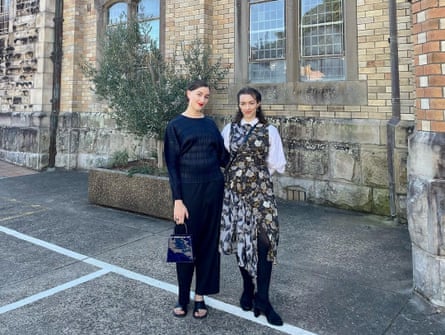
Hannah McElhinney and her partner, Hannah, share a lot. A name, a life, a dog, an apartment. But after eight years there is one thing the couple don’t share – a bank account. Despite being newly engaged and planning a wedding, their finances are separate to the point of having separate home loans.
While this arrangement might initially sound extreme, both feel it’s key to a healthy relationship. The setup allows them total control over how they spend and manage their money. Occasionally, they’ll team up for short periods if they are travelling or have a savings goal, but generally they just take turns paying for household expenses and use an app to ensure it’s kept equal.
 View image in fullscreenHannah McElhinney (right) and her partner, Hannah. ‘I don’t have to feel any guilt when I blow money on something,’ McElhinney says. Photograph: Hannah McElhinney
View image in fullscreenHannah McElhinney (right) and her partner, Hannah. ‘I don’t have to feel any guilt when I blow money on something,’ McElhinney says. Photograph: Hannah McElhinney
While this creates more day-to-day management, both are happy with it. “I think it’s good to have separateness in a relationship,” says creative director McElhinney, 32. “We both love fashion and one of the things we do together is shop … It’s a really joyful part of our relationship and it’s nice not having to negotiate finances around that and give permission.
“I can encourage Hannah to spend money on something that she likes and not feel, well it’s our money. And vice versa. I don’t have to feel any guilt when I blow money on something that someone else might feel is silly.”
Separate home loans might seem unusual, but the decision to never combine financial lives is becoming more common. Though these are not scholarly sources, a 2021 attitudinal survey from YouGov found 75% of Australian millennials believed traditional joint accounts “are not suited for modern relationships”; while a 2023 US survey from Bankrate found that 43% of gen Z and 31% of millennials prefer to keep all of their accounts separate. For older generations – where shared expenses like school activities and mortgages are more common – the figures were under 20%.
Accountant Michael Fox has observed a growing hesitancy to pool cash among his younger clients. For him, the trend is social as much as financial. “My observation from talking to people is that there is just a lack of commitment,” he says, adding that it crosses class and cultural backgrounds. “People don’t really combine their finances with enthusiasm. It’s more like, ‘Well we’ve been together for 10 years, we’re probably a couple’.”
When you find someone you love, it’s hard to say … ‘come join me in the instability’James, paramedic
Gillian Coote of Coote Family Lawyers has seen the same pattern and believes it is a symptom of a broader scepticism of commitment, often informed by personal experience. She says the shift towards keeping finances separate is partly generational, but it also occurs in “second marriages, second relationships later in life”.
Coote says the “grey divorce” wave has left adult children feeling less sentimental about the prospect of everlasting love. “People are thinking differently about relationships. To be honest, they’re more mercenary. It’s no longer, ‘Well we’re going to be together forever and aren’t we happy and aren’t we lucky?’ It’s more, ‘Well we’re together now and it’s going OK, but what can I do to prevent disaster?’”
For women in particular, sharing money can also lead to the fear of being controlled by a partner. Coote says that a more visible public conversation about financial abuse has left clients feeling defensive about maintaining agency over and access to money. “If I see someone, and they’re often women, who doesn’t have an account in her own name, that’s a massive lack of control and power,” Coote says. “That trend is still there, but I think younger women are more likely to say, ‘I’m keeping my own accounts and we’ll just put a certain amount into a joint account to run the household’.”
A post-piggy bank world: what does money mean if you can’t hold it in your hand?Read more
When graphic designer Naomi Lee Beveridge, 32, moved in with her partner, Alex, two years ago, she was confident they were making the right decision. They’d been together for more than four years and were very much in love. But after successfully combining belongings, pets and household responsibilities, their finances have remained separate. Though the couple discuss buying a house, Beveridge admits: “I don’t know exactly how much money they have and they don’t know exactly how much money I have. We don’t really talk about it because for me money is a bit of a weird issue.”
Like the Hannahs, Beveridge and her partner have separate bank accounts. When joint expenses come up, one pays and the other transfers half. But as they contemplate sharing a mortgage, Beveridge has realised even the smaller commitment of sharing a bank account represents a different kind of intimacy for her.
Even though Beveridge loves and trusts Alex, that stability has not erased the stress from a difficult past, which includes periods of illness-induced precariousness and limited familial financial backup. “I worry that combining finances will be a risk for me because I have more to lose.”
“I’ve put a lot of effort into making myself stable, making the right sacrifices, spending money on the right things and always having something left if something goes wrong.”
But while keeping individual accounts allows for day-to-day freedom, it should be stressed that from a legal perspective, in Australia, separate finances make little difference if a couple decides to separate.
“Keeping it separate doesn’t protect it,” Coote says. “Because of the Family Law Act, at the end of the day, it doesn’t matter whose account it’s in.” Without a prenup, couples who have been living together for more than two years can make claims on each other’s assets if they split up – married or not. In the short term, “it gives you power of control in terms of if you’re left or you leave … but it doesn’t change the outcome”.
 View image in fullscreenNaomi Lee Beveridge is reluctant to share finances but says, ‘I’m pretty lucky to be able to talk to my partner about anything’.
View image in fullscreenNaomi Lee Beveridge is reluctant to share finances but says, ‘I’m pretty lucky to be able to talk to my partner about anything’.
Not surprisingly, Coote says, “there is a remarkable increase in prenups and cohabitation agreements”.
As Coote has observed, money can touch on issues deeper than who pays the Netflix bill. For heterosexual couples, it can also bring up complex tensions over gender equity. Interior designer Mary*, 36, initially suggested sharing an account with her partner after noticing she was incurring expenses through household labour. “I felt like I was the person buying the new dustpan, the new towels, buying things for the house out of my own money.”
But she was spending more on other things too. “I get my haircut more, I get waxes, I like clothes and care about how I look more than he does. It’s stupid but it’s a fact.”
The couple sat down to do a budget, review their incomes and see where they could come to agreements on when to spend and when to save. Navigating judgment from her partner and questioning her own choices “was uncomfortable for me at times”, Mary says.
Eventually they decided to separate their finances a bit. Now they each have their own accounts and contribute a set amount to a joint fund for shared expenses.
Can I get a refund? After I cancelled a gym membership via email, they debited $700 from meRead more
Gendered expectations can cut both ways. James*, 37, a paramedic, has been with his partner for more than seven years. Earlier in their relationship, James was a freelancer with an inconsistent income, while his partner has always worked in tech and earned more.
Before he changed careers, “my partner has tended to pay for more things”, he says. This setup helped provide the couple with a level of stability, but it gave James a sense of guilt. “When you find someone you love that you want to spend your life with, it’s hard to say … ‘come join me in the instability’. You’d rather just shoulder that side of it yourself.”
And while he doesn’t believe this period affected their relationship, he adds: “It did feel shitty for a long time. I’m very proud of her and have zero issue being the one who makes less money. But we do live in a patriarchal world and consistently having waiters put the bill on my side of the table then having to slide it over to her gets tiring … Sometimes you do feel judged.”
For other couples, the convenience of combining finances trumps any awkwardness. Sam*, a 34-year-old business owner, says she and her husband decided to combine finances when they realised they were fighting about money. “I know people who have been with their partner for a really long time and they talk about having to split the grocery bills. I just find that so painful … I think, how can you ever work out what’s fair? You’d have to constantly be keeping tabs? We don’t have to do that.”
Sam and her husband have a shared account where all their income and government subsidies go. Combining incomes helped them pay off debts quicker, reduced anxiety when Sam was on maternity leave and generally created a feeling of unity, she says.
A huge bonus of having our finances combined is that everything is out on the table and there’s no secrecy Sam, business owner
Now Sam is the primary earner, while her partner focuses more on their two children and the household. Having access to shared money gives her husband a sense of agency. “We’re aware that I make a lot more and that’s OK, because he picks up the slack in a lot of areas,” she says. Her husband is free to treat himself with shared finances because, “he does contribute, it’s just not financially”.
Sam recognises this approach comes with its own hurdles, as it makes all big purchases feel like joint decisions,
but talking frankly about money has deepened their intimacy. “I think a huge bonus of having our finances combined is that everything is out on the table and there’s no secrecy … It’s all really clear.”
After seeing many relationships come apart over money, Coote believes that, rather than scrutinising receipts, couples should come to financial arrangements that give both parties “responsibility and control”. Each partner should feel they contribute to the household – be that through cash or labour. They also need to have access to money – whether it’s their own or shared.
For Coote, the simplest way to strike that balance is for couples to “have a joint account” but also “have separate accounts – because you should be able to run your life”.
But no arrangement can guarantee a stable and fair household where all parties are rewarded and respected equally . Coote’s only suggestion on that front is communication. “It’s very important that people have open conversations about their expectations … in terms of how they’re going to fund a joint lifestyle while making joint decisions.”
Following all her financial soul searching, Beveridge agrees. “I’m pretty lucky to be able to talk to my partner about anything … They might not have an answer but at least I can put it out there and have a listening ear.”
* Names have been changed

